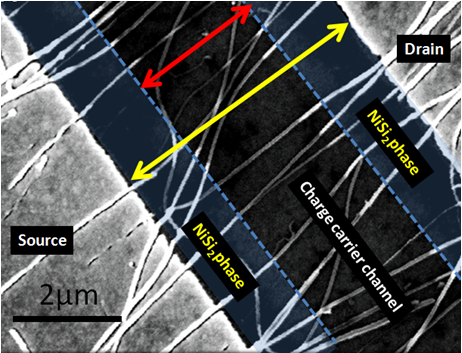We demonstrate a pH sensor based on ultrasensitive nanosized Schottky junctions formed within bottom-up grown dopant-free arrays of assembled silicon nanowires. A new measurement concept relying on continuous gate sweep is presented, which all lows to determine straightforwardly the point of maximum sensitivity of the device and to perform sensing experiments in the optimum regime. Integration of devices into a portable fluidic system and electrode isolation strategy permits stable environment and enables the long time robust FET sensing measurements in a liquid environment. Investigations of the physical and chemical sensitivity of our devices for changing pH value and their comparison to theoretical limits are discussed as well. We believe that such a combination of the nanofabrication and engineering advances make this Schottky barrier powered silicon nanowires lab-on-a-chip platform suitable for efficient biodetection and even for more complex biochemical analysis.

We demonstrate a pH sensor based on ultrasensitive nanosized Schottky junctions formed within bottom-up grown dopant-free arrays of assembled silicon nanowires. A new measurement concept relying on continuous gate sweep is presented, which all lows to determine straightforwardly the point of maximum sensitivity of the device and to perform sensing experiments in the optimum regime. Integration of devices into a portable fluidic system and electrode isolation strategy permits stable environment and enables the long time robust FET sensing measurements in a liquid environment. Investigations of the physical and chemical sensitivity of our devices for changing pH value and their comparison to theoretical limits are discussed as well. We believe that such a combination of the nanofabrication and engineering advances make this Schottky barrier powered silicon nanowires lab-on-a-chip platform suitable for efficient biodetection and even for more complex biochemical analysis.
